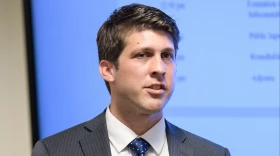Due to the loss of 10 days of instruction time Florida Gulf Coast University will incorporate a "catch-up schedule" using Saturdays to make up the days.
The plan was announced by FGCU President Mike Martin on Monday.
"To say we have been through a historic natural disaster may be an understatement," Martin said in a release. "Everyone in Southwest Florida, indeed most of Florida, have felt significant effects from Hurricane Ian. And these effects will be felt for a long time."
Martin said FGCU was moving as fast as possible to restart while being sensitive to challenges facing students, faculty and staff.
"As of today, we intend to begin classes again on October 10. And we will soon commence a catch-up schedule" Martin said.
The university's president said that when FGCU restarts on October 10 the university will incorporate weekends, predominantly Saturdays, to hold classes.
"The new academic calendar takes into account all of our terms for Fall 2022, including the traditional 16-week semester, Fall A, Fall B and the FGCU Accelerate seven-week programs known as Session I and Session II," Martin said.
He added that further details will be released later.
"We will be offering flexible options, including, but not limited to, Satisfactory/Unsatisfactory (pass/fail) and opportunities for remote attendance and instruction. We encourage faculty to be innovative, creative, patient and flexible as we move forward."FGCU President Mike Martin
"We will be offering flexible options, including, but not limited to, Satisfactory/Unsatisfactory (pass/fail) and opportunities for remote attendance and instruction," Martin said. "We encourage faculty to be innovative, creative, patient and flexible as we move forward."
Martin said an alternative plan, to complete the fall 2022 semester in January 2023, would compound the scheduling challenge.
"As we have reworked the schedule, our semester will end on time, with no impact to commencements, scheduled holidays or breaks," he said. "Any and all university space will be prioritized to accommodate class meeting needs. More will be coming on these issues and plans. Remember we are all in this together. I know the Eagle Nation is up to the challenges ahead."
WGCU is your trusted source for news and information in Southwest Florida. We are a nonprofit public service, and your support is more critical than ever. Keep public media strong and donate now. Thank you.




